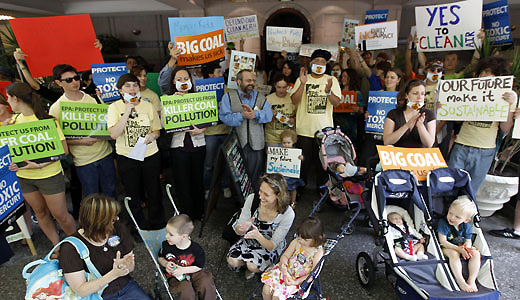
Mercury pollution, caused by coal-fired power plants, is a growing worldwide problem. Next week, when diplomats from 128 countries meet in Geneva, Switzerland, that problem will be addressed as they negotiate a treaty on emissions of the deadly neurotoxin.
The conference will be the last of five meetings, and talks of a treaty are expected soon after. Signatories have suggested signing the treaty in Minamata, Japan, a town that famously fell victim to widespread mercury poisoning. But many believe the measures taken against mercury emissions will be soft, and thus inconsequential in curbing the toxin, which can cause brain and IQ damage to the unborn, injure the heart and kidneys, and rack up massive health care costs each year.
The treaty as proposed will reportedly not require identification or remediation of contaminated mercury sites, nor will it require polluters to pay for health damage or environmental clean-up. Ultimately, the treaty is not expected to reduce global mercury levels in fish and seafood.
In 2012, the Obama administration made much-needed progress on reducing mercury emissions. The EPA adopted the first-ever Mercury and Air Toxics Standards, which will prevent 90 percent of mercury that emanated from power plants from being released into the air. But as U.S. coal consumption dwindles, it increases elsewhere, and experts say that a large-scale, global solution is needed to reduce these harmful pollutants. As it is, mercury raining down from coal-fired plants has poisoned fish in every single U.S. state. As for fish in Japan and Uruguay – they contained mercury levels so high that according to EPA guidelines, they are regarded as unsafe for human consumption.
The reason why the treaty is so controversial is because it only calls for reductions on a per-facility basis, rather than demanding an overall reduction to emissions in air and water. It will, however, curb emissions from gold mining, which is currently largely unregulated and a significant contributor to mercury pollution.
Experts see the lack of a crackdown on corporate coal-fired power plants as a large part of the problem. “When corporations choose not to remove as much mercury as is humanly possible from the exhausts of their plants, they are damaging the environment, which in turn harms and poisons children and adults,” said Dr. Jerome Paulson, medical director of the Children’s National Medical Center.
Scientists and environmentalists conclude that something substantial must be done to combat mercury toxicity now, because the effects of the pollutant are long lasting and severe. David Streets, an environmental scientist at Argonne National Laboratory in Illinois, noted, “Once emitted into the air, it’s like a genie that has escaped the bottle. It takes decades or even centuries to get it fixed.”
Photo: Demonstrators rally in support of EPA regulations on toxic air pollution from power plants. (Matt Rourke/AP)












Comments